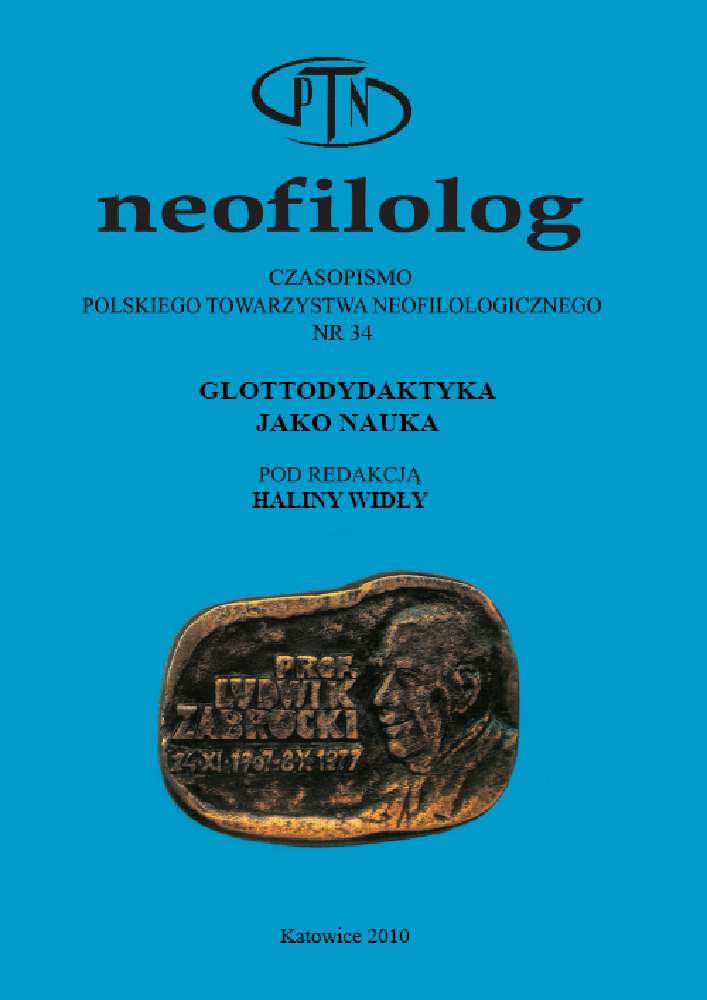Abstrakt
Think-aloud protocol (TAP) makes it possible to discover human thoughts while conducting a task, whilst retrospection enables us to uncover thoughts that emerge after the task has been completed. The content of thoughts has been a subject of research in psychology and recently in education. Discovering the content of teachers’ self-reflection may raise the understanding of what it means to educate teachers-to-be and how to help them become reflective practitioners. Applying TAP and retrospection appears a thought-provoking experience especially when it comes the procedure and outcome.
Bibliografia
Arends, R. I. 1994. Ucz ymy się nauczać. Warszawa: Wydawnictwa Szkolne i Pedagogiczne.
Baker, M. (red.) 2001. Routledge Encyclopedia of Translation Studies. London: Routledge Taylor and Francis Group.
Basil, H. 2001. Teaching and Researching Translation. Harlow: Pearson Education Limited.
Bauman, T. 2001. „Strategie jakościowe w badaniach pedagogicznych”. (w) Pilch, T. i Bauman,T. Zasady badań pedagogicznych. Strategie ilościowe i jakościowe. Wydawnictwo Akademickie ŻAK
Celce-Murcia, M. (red.). 2001. Teaching English as a Second or Foreign Language. Boston, MA: Heinle and Heinle.
Ericsson, K. A. I Simon, H. 1993. Protocol Analysis. Verbal Reports as Data. Boston: MITPress.
Ericsson, K. A. 2002. Protocol analysis and Verbal Reports on Thinking (updated). http://www.psy.fsu.edu/faculty/ericsson/ericsson.proto.thnk.html DW 05.10.2009.
Jaaskelainen, R. 2001. „ Think-aloud protocols” (w) Routledge Encyclopedia of Translation Studies (red. M. Baker). London: Routledge Taylor and Francis Group.
Kussmaul, P. 1995. Training the Translator. Amsterdam/Philadelphia: John Benjamins Publishing Company.
Lewis, C. i Rieman, J. 1993. Task-Centered User Interface Design. http://hcibib.org/tcuid/chap-5.html DW 05.10.2009.
McDonough, J. i McDonough, S. 1997. Research Methods for English Language Teachers. London: Arnold.
Murphy, J.M. 2001. „Reflective teaching in ELT” (w) Teaching English as a Second or Foreign Language (red. M. Celce-Murcia). Boston, MA: Heinle and Heinle.
Okoń, W. 1979. Szkoła współczesna. Przemiany i tendencje rozwojowe. Warszawa: Książka i Wiedza.
Pilch, T. i Bauman, T. 2001. Zasady badań pedagogicznych. Strategie ilościowe i jakościowe. Warszawa: Wydawnictwo Akademickie “Żak”.
Pressley, M. i Afflerbach, P. 1995. Verbal Protocols of Reading: The Nature of Constructively Responsive Reading. Hillsdale, NJ.: Erlbaum.
Renkl, A. 1997. „Learning from worked-out examples: A study on individual differences”. Cog. Sci. 21: 1-29.
Richards, J.C. i Farrell, T.S.C. 2005. Professional Development for Language Teachers. New York: Cambridge University Press.
Wysocka, M. 2003. Profesjonalizm w nauczaniu języków obcych. Katowice: Wydawnictwo Uniwersytetu Śląskiego.
Zawadzka, E. 2004. Nauczyciele Języków Obcych w dobie przemian. Kraków: Oficyna Wydawnicza „Impuls”.
Licencja
Prawa autorskie (c) 1970 Magdalena Witkowska

Utwór dostępny jest na licencji Creative Commons Uznanie autorstwa – Bez utworów zależnych 4.0 Międzynarodowe.
Przedstawiany utwór (artykuł) upubliczniany jest na podstawie umowy z autorem i na licencji Creative Commons Attribution-NoDerivatives 4.0 International (CC BY-ND 4.0).
Użytkownicy mają obowiązek podania wraz z rozpowszechnionym utworem, informacji o autorstwie, tytule, źródle (odnośniki do oryginalnego utworu, DOI) oraz samej licencji;
- bez tworzenia utworów zależnych,
- utwór musi być zachowany w oryginalnej postaci.
Uniwersytet im. Adama Mickiewicza w Poznaniu zachowuje prawo do czasopisma jako całości (układ, forma graficzna, tytuł, projekt okładki, logo itp.).
